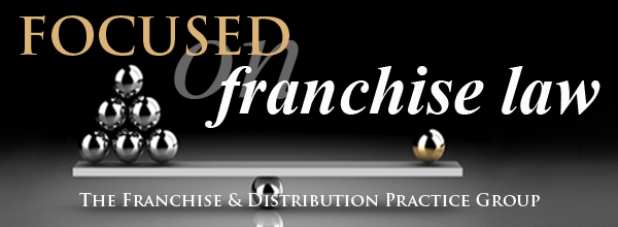10 Ways to Reduce Vicarious Liability Risks; and Paying Attention to Contractual Statutes of Limitation

bkurtz@lewitthackman.com
tgrinblat@lewitthackman.com
msoroky@lewitthackman.com
kwallman@lewitthackman.com
December 2015
National Award: Best Law Firms 2016 (Franchise Law)
We were named one of U.S. News & World Report’s 2016 Best Law Firms for franchise law. According to the publication, the selection is based on rigorous scrutiny of client and lawyer evaluations — at least one attorney from the firm must be eligible for Best Lawyer ranking in a particular practice area within a specific region. David Gurnick has been selected to the Best Lawyers in franchise list for the past four, consecutive years: Franchise Law National Ranking.
Barry Kurtz in Los Angeles Business Journal
“First time restaurant licensors sometimes struggle to help partner companies get off the ground. At the same time, they sometimes realize too late that their partners lack skills to run the business.” For more information regarding Los Angeles’s popular gourmet marketplace and cafe, Joan’s on Third, read: Eateries Fed Up.
Tal Grinblat, David Gurnick and Nicholas Kanter in Valley Lawyer
“Individuals and businesses are becoming increasingly vulnerable to electronically posted falsehoods, invasions of privacy, revenge and other negative content… There are several strategies and legal tools for victims and lawyers to fight back.”
FRANCHISOR 101:
10 Ways Franchisors Can Reduce Vicarious Liability Risks

 The U.S. Department of Labor says McDonald’s is liable for actions of franchisees. In the last three months a California federal court said McDonald’s could be liable for a franchisee’s alleged failure to pay overtime and provide meal and rest breaks.
The U.S. Department of Labor says McDonald’s is liable for actions of franchisees. In the last three months a California federal court said McDonald’s could be liable for a franchisee’s alleged failure to pay overtime and provide meal and rest breaks.
But another California federal court dismissed similar claims against the franchisor of ARBY’s. In 2014 the California Supreme Court said Domino’s Pizza was not liable for misconduct by a franchisee’s manager. The decision was close, decided by a 4-3 vote. All of these cases concern franchisor liability for acts and omissions of franchisees.
There are several theories on which a franchisor may be liable for acts of omissions of a franchisee.
One is the claim that the franchisor has so much control over the franchisee as to be, in effect, a principal or employer, with the franchisee being an agent. Another is the claim that the franchisor let the franchisee appear to the public or to employees to be an agent or branch of the franchisor. A third theory, developed in recent years, is that the franchisor exercises control over the franchisee’s employees, and is therefore their joint employer along with the franchisee they work for.
Here are ten steps franchisors can take to reduce the risk of being liable for actions of their franchisees:
1. Choose or change the franchise company’s name to something different from the name of the franchise. If the franchise brand is “Apex Advisors” or “Bubble Balloon Parties” the franchisor could be AA Franchising, LLC or BBP, Inc., or another formulation. Many lawsuits simply use the name of the franchise as the Defendant. By using a different name, a franchisor will reduce the risk of being inadvertently named as a defendant.
2. Require each franchisee to use and inform others of its/their/his/her true name. Franchisee business cards, stationery, checks, signage, advertising, menus, service lists, memos, and other materials should state the true name of the person or company that operates the franchise. Require each franchisee to display a plaque, for example: “This Apex Advisors Franchise is independently owned and operated by Sarah and Johan Jones.” Other ways are to present certificates of training, longevity (years of ownership) and awards that state the independent owner’s name.
3. Require the franchisee to display a sign in the employee area, possibly on the doorway to the work and customer area, reminding employees who owns the franchise. For example: “This franchise is independently owned by Sarah and Johan Jones. We appreciate your service and want to remind you that you are employed by us, not Bubbles Balloons.” The franchisee should state a similar message on communications to service providers, inventory suppliers, utilities, chambers of commerce and other trade associations.
4. Review the franchise agreement, operating manual and operating policies to remove controls or requirements that are not essential to goodwill of the brand. For example, restricting the activities of franchisees’ employees when they are not at work; specifying the color scheme of the employees-only area, or designating suppliers for a franchisee’s holiday party are matters that do not protect the brand, and should be removed from the operating manual.
5. Remind franchisees in writing of all operational aspects of the business in which they are the decision-maker. Examples include site selection (franchisor does not select site but only consents to site selected by franchisee), lease negotiation, where and how to advertise, recruiting personnel, deciding who to hire, setting compensation, conducting reviews and giving raises, setting and scheduling hours, choosing which publications to advertise in, choosing which charities to support, setting prices, managing inventory, whether to extend credit; how much credit to extend; and declining to do business with some customers.
Store and location decor is an area where franchisors may consider allowing franchisees more flexibility. A McDonald’s or other franchise can still be recognizable as part of the chain, even if the franchisee has wider discretion to customize or individualize many aspects of layout and decor.
6. State in the franchise agreement that the franchisee is responsible for safety of customers, workers and vendors who are at the premises and require the franchisee to be attentive to these matters.
7. Make sure the franchise agreement has indemnity language requiring the franchisee to indemnify the franchisor for any claims arising from the franchised business including employment claims by the franchisee’s employees against the franchisor.
8. The franchisee should be required to purchase liability insurance and name the franchisor and franchisor’s management and personnel as additional insureds under the franchisee’s insurance.
The franchisor should require the franchisee to annually provide a copy of the full policy, so in the event of a claim the franchisor can tender it directly to the insurer. In addition, the franchisee should be required to purchase employment practices liability insurance with a co-defendant endorsement in favor of the franchisor.
9. In the franchise agreement require the franchisee to cooperate in the defense of any vicarious liability claim.
10. Franchisor personnel should not give directions or instructions to employees of the franchisee. For example, in an inspection visit of a franchisee’s location, franchisor personnel should call the franchisee’s attention to any deficiencies, but should not presume to instruct an employee of the franchisee to make any changes. The employees work for the franchisee, not for the franchisor. Employees should not come to view the franchisor as their supervisor.
In the Arby’s and McDonald’s cases mentioned above, Arby’s was found not liable because Arby’s did not make decisions about hours, breaks, or hiring and firing of the franchisee’s employees. In the McDonald’s case, the court found McDonald’s might be liable, because the franchisees’ employees said they believed McDonald’s was their employer, partly because they wore McDonald’s uniforms, served McDonald’s food in McDonald’s packaging, received paystubs and orientation materials marked with McDonald’s name and logo, and applied for their jobs through McDonald’s website.
The above are some steps a franchisor can take to reduce the risk of being sued and of being liable for acts and omissions of a franchisee. This article does not list every possible step that can be taken, but provides a good place to start.
FRANCHISEE 101:
Pay Attention to Contractual Statutes of Limitation

Many franchise agreements include a contractual limitation period or time limit when parties can bring a claim for relief. Though the franchise agreement is often written by and for the franchisor, these limitations can help or hurt either party.
Recently a court in Ohio ruled that a contractual time limit for claims, barred an action by the franchisor. The franchisor, Buffalo Wings and Rings, sent a notice to its franchisee in early 2011 describing claims. More than one year later, the franchisor filed a lawsuit.
At the franchisee’s request the court dismissed the action, ruling that the franchisor’s claim was barred by the one year limitation period stated in the franchise agreement. The Buffalo Wings and Rings case is a reminder to franchisors and franchisees, to be thoughtful of both statutory and contractual time limits for bringing claims, and is a reminder that a statutory or contractual time limit may be a successful defense to a claim by the other side.
